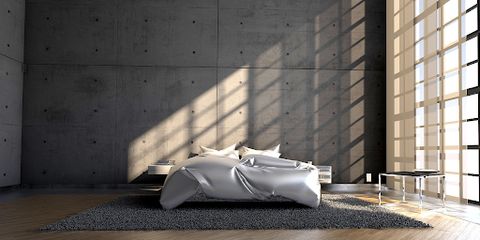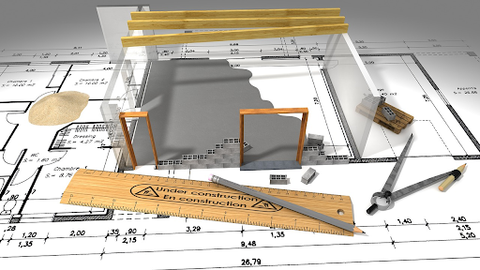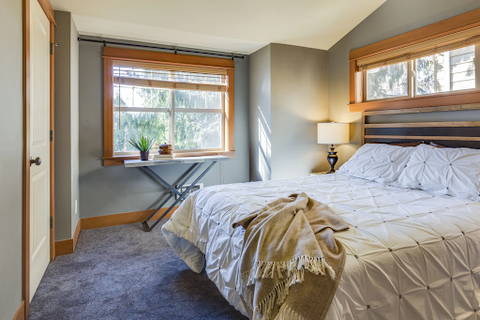The garage is often one of the most underutilized spaces in a house. Most people just end up using the garage to store trash, items, and appliances that they no longer use - and if there’s any space left, then they park a car or two.
Why not convert such a space to add value to your life?
Converting a garage into a master bedroom is a great way of making use of a space that’s often left forgotten. Why? Not only do you gain an extra room, the overall value of the house also rises as well with all the extra square footage.
MySitePlan designers use computer-aided design software to create site plans based on the level of detail you need. Here’s what to expect when planning to convert a garage into a master suite. With this knowledge, you’ll be able to communicate the kind of space you want with confidence.
Related: Ultimate Guide to Creating the Perfect Site Plan for Your New Home
Planning A Garage Conversion
Is it legal?
The very first step to planning a garage conversion is to figure out whether or not it’s legal.
Many homeowners start the process without checking the legality and face issues later, especially if they have to sell the house. This means that it's necessary to obtain permits before starting any work.
It’s important to check local building codes while planning to convert a garage, since there are many rules that affect how the room can be built. The codes might state rules regarding the installation of everything from a bathroom to a closet. You should always comply with these codes because they affect zoning, insurance, and taxes.
Related: Zoning Permit: Everything You Need to Know

Brainstorming
Then, it’s time to start thinking about what you want the bedroom to look like. Write down everything you can think of—how big it should be, if you want a bathroom or a half-bathroom, and even how you might decorate it. Thinking about the details will help you communicate more easily with your site planners, who will use your specifications to inform their decisions on technical elements.

Collaborating with Your Site Planner
The next step is to plan the layout of your new room. Checking the viability of the plan with regards to space is important. It’s recommended to hire a contractor as they can plan the layout in-sync with the rest of the house. They will use information sources like satellite imagery, GIS imagery, county parcel maps, and other public sources to make sure your plan is feasible.
Are you ready to convert your garage? Get started with MySitePlan.
Let’s Talk Money
While planning, it is important to remember that converting a garage will make a dent in your wallet. One needs to decide on a budget for remodeling and start setting goals accordingly. It won’t be nearly as pricey as remodeling a basement or adding another room altogether - the cost of which can go up to $100,000.
A garage conversion can cost anything between $3,000 to $30,000 depending on the range of upgrades. If the goal of the remodeling is to make a garage into a fully-furnished master suite, the cost is likely to be on the higher end.
The costs will differ based on the neighborhood and state, from higher costs in metropolitan areas to relatively lower costs elsewhere. It’s recommended to get an estimate from a planner or an architect while planning the remodeling.
Pros Of Converting A Garage
- The biggest benefit is that homeowners gain additional square footage. A two-car garage can add up to 600 sq.ft of space.
-
Converting a garage into a room, especially if the garage is underutilized, can increase the value of your home. Adding a usable room is a good idea for investment purposes.
- An additional master bedroom can do wonders for a growing family or a family with seniors who have trouble accessing higher floors. Using the master bedroom as an in-law suite is also a big advantage.
-
While planning to convert the garage to the master suite, it is a good idea to consider the motive behind it and then move ahead with the planning. Who will be using it? Do you want to rent it out? What will the layout be? These are good questions to ask.

Cons Of Converting A Garage
-
The biggest con of converting a garage is losing out on a sheltered space for cars. While planning, keep this point in mind as you will be losing out on a sheltered parking space. This isn’t a big deal if you have two garages or if your street isn’t very crowded.
- Some municipalities require homeowners to construct off-street parking spaces for vehicles unless you have ample driveway space. This might lead to an additional expenditure or cause you to scrap all plans of garage conversion.
- A converted garage can also reduce the value of a house if a house is in the snow belt, where buyers demand an insulated and dedicated parking spot.
- While planning a garage remodeling and setting the budget for it, keep a buffer for hidden costs. Not only should it leave room for major structural changes, but it should also include room for any permit costs and fees.
How Long Does It Take?
Planning a garage conversion exhausts the most important resource: time. A single-space garage conversion can take anywhere between one week to one month depending on the scale of remodeling.
A double-space garage will obviously take longer. Planning and permissions will take additional time and money. A garage conversion project is not only a huge financial investment but also requires time and effort, which is why using a site planner can help you save time.

In Conclusion
Remodeling a garage is a huge decision that shouldn’t be taken lightly. It'll affect the overall value of the house and change how you live in it on a daily basis.
Making use of real estate that's otherwise going unused is generally a step in the right direction. However, the devil is in the details, and that’s where most people falter.
A garage conversion is recommended to those homeowners who'll be keeping the house for the long-term, rather than those who wish to convert it to a master suite only to sell the house in a few years.
A garage is a huge selling point for buyers, but so is an additional room - it falls on the current homeowner to make a decision based on their lifestyle and family needs.
From parking to zoning laws and market values, a garage conversion can affect all of these considerations and more, which is why thorough research should be done before laying ground (so to speak!).
But with MySitePlan, you can eliminate logistical challenges and save time. Our experienced site planners use AutoCAD to create precise site plans that adhere to local compliance regulations and your own requirements. When you’re converting a garage, do it the right way—the easy way.
Related: How to Read a Site Plan




